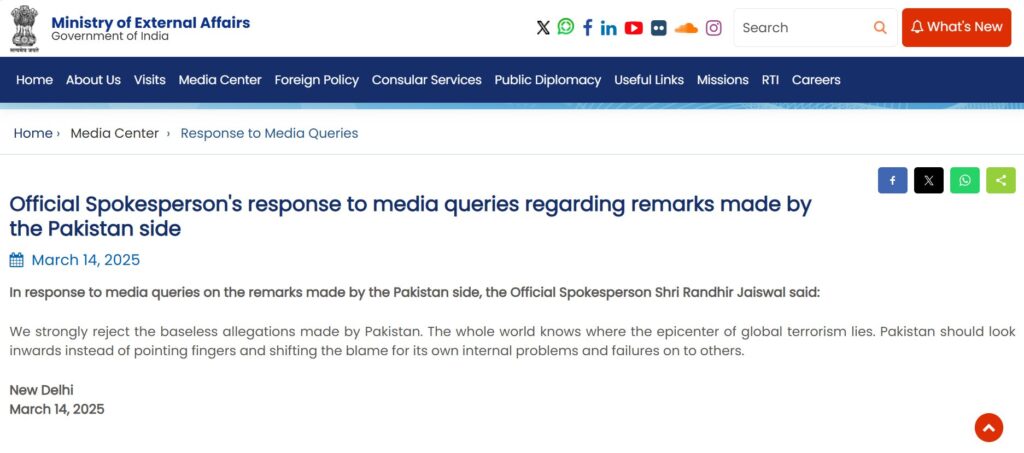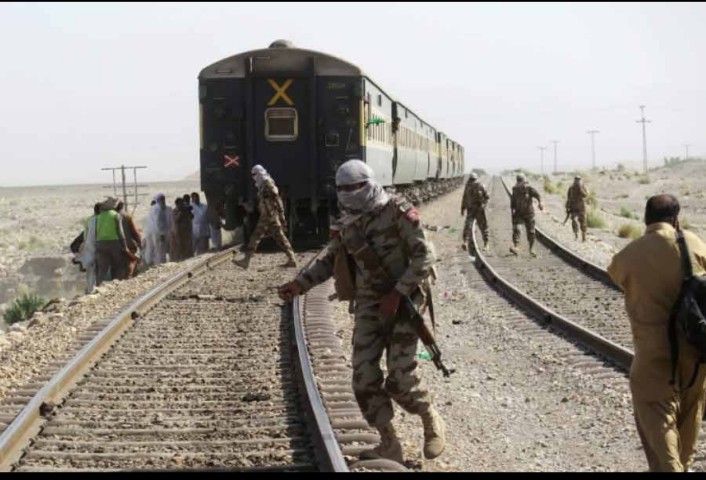By The Sampadak Express
India firmly rejected Pakistan’s recent accusations of “sponsoring terrorism,” asserting that the global community is fully aware of the true “epicenter of global terrorism.” This response came after Pakistan’s blame directed towards India for supporting terror activities, although Islamabad did not directly link India to the deadly Balochistan train attack that killed 21 passengers.
Ministry of External Affairs spokesperson, Randhir Jaiswal, responded strongly, stating, “We strongly reject the baseless allegations made by Pakistan. The whole world knows where the epicenter of global terrorism lies.” He added that Pakistan should focus on addressing its internal issues instead of shifting blame for its domestic problems.

The allegations from Pakistan came after a tragic attack on the Jaffar Express on Tuesday, which resulted in a prolonged hostage situation lasting more than 24 hours. While Pakistan has routinely accused India of supporting Baloch separatist groups, this time, Pakistan’s Foreign Office spokesperson Shafqat Ali Khan specifically referred to Afghanistan as the origin of the attack’s coordination.
Khan maintained that the core of Pakistan’s position remained unchanged, claiming, “India is involved in sponsoring terrorism against Pakistan.” He added that Pakistan had traced calls to Afghanistan related to the attack, shifting the focus of the blame to its neighbor.
Khan also accused India of running a “global assassination campaign” and destabilizing its neighboring countries. He criticized Indian media for allegedly glorifying the Balochistan Liberation Army (BLA), which Pakistan considers a terrorist organization.
Furthermore, Khan called on Afghanistan to take responsibility for the attack, stating that the attackers were in direct communication with “Afghanistan-based planners throughout the incident.” He urged Kabul to ensure that its territory was not used by militant groups targeting Pakistan, calling for cooperation to bring the perpetrators and their sponsors to justice.
However, Afghanistan’s Ministry of Foreign Affairs swiftly rejected Pakistan’s claims. Spokesperson Abdul Qahar Balkhi dismissed any involvement, urging Pakistan to address its own security challenges instead of making “irresponsible remarks.”
In addition to the terrorism-related tensions, Pakistan reiterated its stance regarding Afghan Citizen Card (ACC) holders, confirming that the March 31 deadline for their departure from Pakistan remains unchanged. Khan stated that while Afghanistan nationals were granted special provisions, including relaxation for staying in Pakistan, the government has now decided that those with ACC should leave by March 31. Those remaining after the deadline will be considered illegal residents, and Pakistan will take legal action accordingly.
The back-and-forth between India, Pakistan, and Afghanistan highlights the ongoing regional tensions surrounding terrorism, security, and the political situation in Balochistan.






